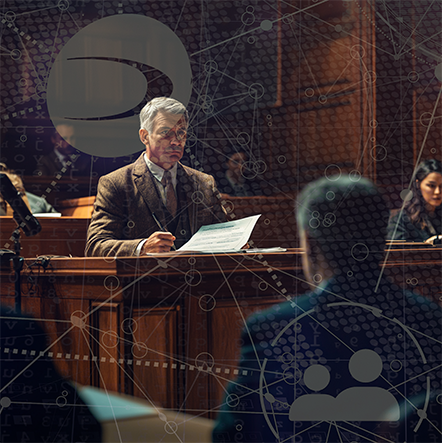Introduction
In legal disputes, safety engineers are essential in cases involving slip, trip, and fall incidents. These accidents, often occurring in public spaces or workplaces, can lead to severe injuries and significant financial consequences. Establishing the facts of these incidents is vital for determining liability and ensuring justice. This comprehensive guide delves into the multifaceted role of safety engineers as expert witnesses, outlines their qualifications, and illustrates their significant impact on legal outcomes, including real-life case studies that highlight their contributions.
What is a Safety Engineer Expert Witness?
A safety engineer expert witness specializes in providing testimony in legal cases involving safety engineering principles. These professionals are frequently called upon to evaluate accidents, analyze safety protocols, and clarify complex technical issues for judges and juries. Understanding their role is essential for attorneys managing slip, trip, and fall cases. Their insights not only provide clarity but also aid in establishing the facts needed for a successful legal strategy.
Key Responsibilities of Safety Engineers
1. Expert Testimony
One of the primary responsibilities of safety engineers is to provide expert testimony regarding safety standards and practices relevant to specific cases. Their opinions help determine whether safety protocols were adhered to and whether negligence played a role in the incident. For instance, in a slip and fall case, a safety engineer might testify regarding the adequacy of maintenance practices in a commercial property.
2. Consultation and Analysis
In addition to courtroom appearances, safety engineers consult with legal teams during the pre-trial phase. They help assess evidence, analyze accident reports, and prepare for depositions. Their expertise enables attorneys to build a strong case based on technical facts and safety regulations. This collaborative effort is crucial for crafting effective legal strategies.
3. Conducting Investigations
Safety engineers conduct thorough investigations of accidents. This includes:
- Site Inspections: Visiting the incident location to gather evidence and assess conditions.
- Root Cause Analysis: Identifying underlying factors contributing to the accident, such as equipment failure or inadequate safety measures.
These investigations provide invaluable insights into how and why the incident occurred.
4. Report Preparation
After their investigations, safety engineers prepare detailed reports summarizing their findings. These reports are critical in legal proceedings and typically include:
- Assessments of compliance with safety standards.
- Recommendations for improvements to prevent future incidents.
- Expert opinions on the causes of the accident.
A well-prepared report enhances the credibility of the expert’s testimony and serves as critical evidence in court.
Qualifications of a Safety Engineer Expert Witness
1. Educational Background
Most safety engineers possess advanced degrees in engineering, occupational safety, or related fields. This educational foundation gives them the knowledge necessary to assess safety issues effectively. Many also hold certifications from recognized organizations such as the Board of Certified Safety Professionals (BCSP) or the American Society of Safety Professionals (ASSP). These credentials show their commitment to maintaining high professional standards.
2. Professional Experience
Experience is vital in safety engineering. Expert witnesses often have years of practical experience in various industries, such as safety management or engineering roles. This extensive background allows them to effectively apply theoretical knowledge to real-world situations. Their hands-on expertise enables them to understand the complexities of safety protocols and practices.
3. Continuing Education
As safety regulations evolve, expert witnesses engage in continuing education to stay current with industry trends and legal requirements. This commitment to professional development ensures they provide relevant and accurate information during legal proceedings. By keeping abreast of the latest safety innovations and regulatory changes, they enhance their credibility and effectiveness in court.
The Importance of Safety Engineers in Legal Contexts
1. Types of Cases Involving Safety Engineers
Safety engineers are frequently involved in various legal cases, including:
- Personal Injury Claims: Analyzing accidents to determine liability.
- Product Liability Cases: Evaluating whether products meet safety standards.
- Workers’ Compensation Claims: Assessing workplace safety compliance.
- Regulatory Compliance Issues: Advising on adherence to OSHA regulations.
Their expertise is instrumental in clarifying the complexities of safety-related incidents.
2. Courtroom Dynamics
In court, safety engineers must present their findings clearly and concisely. Their ability to withstand cross-examination and communicate complex technical information can significantly influence the outcome of a case. Effective communication ensures that judges and juries understand the technical aspects of the incident. This clarity is essential for establishing a compelling narrative surrounding the case.
Real Cases Involving Safety Engineers
1. Case Study: ABC Supermarket Slip and Fall
In a notable case involving a slip and fall at ABC Supermarket, a customer fell on a wet floor that lacked proper signage.
- Investigation: A safety engineer was brought in to assess the store’s safety protocols. Their findings revealed that the supermarket had not followed its cleaning procedures and failed to post adequate warnings about wet surfaces.
- Outcome: The safety engineer’s expert testimony was critical in establishing the supermarket’s negligence, leading to a favorable settlement for the plaintiff.
This case underscores the importance of safety engineers in identifying lapses in safety protocols.
2. Case Study: City Park Incident
A visitor at a city park tripped over uneven pavement and sustained injuries.
- Investigation: A safety engineer conducted an investigation and discovered that the city had not maintained the walking paths according to safety regulations. The engineer noted that the city had ignored numerous complaints about the state of the pavement.
- Impact: This testimony helped establish liability against the city, resulting in a successful claim for damages. The expert’s analysis demonstrated municipalities’ need to maintain public spaces adequately.
3. Case Study: Office Building Incident
In a case involving an employee who slipped on a wet floor in an office, the employee sought compensation for their injuries.
- Expert Analysis: The safety engineer analyzed the building’s maintenance logs and cleaning protocols, revealing that the cleaning crew failed to follow safety procedures.
- Outcome: The engineer’s testimony confirmed that the employer had not maintained a safe working environment, leading to a verdict favoring the injured employee. This case illustrates how effective safety management is essential in preventing workplace injuries.
4. Case Study: Retail Chain Injury
In another case, a customer at a retail chain suffered injuries after slipping on a spilled liquid in the aisle.
- Investigation: A safety engineer evaluated the store’s response to spills and determined that the staff had not followed proper procedures for cleanup and signage.
- Findings: The expert noted that the store’s employee training programs on handling spills were inadequate.
- Outcome: The engineer’s findings were instrumental in proving the retail chain’s negligence, resulting in a settlement for the injured customer.
5. Case Study: Hotel Slip and Fall
A guest at a hotel slipped on an unmarked wet floor near the pool area and sustained severe injuries.
- Investigation: A safety engineer assessed the hotel’s cleaning practices and found no proper protocol for maintaining safety around the pool area.
- Expert Testimony: The safety engineer testified about the lack of warning signs and the hotel’s failure to maintain a safe environment.
- Impact: The testimony led to a favorable outcome for the guest and highlighted the hotel’s negligence in safety management.
Benefits of Hiring a Safety Engineer Expert Witness
1. Technical Expertise
Safety engineers possess advanced knowledge of safety standards, regulations, and engineering principles. This technical proficiency allows them to analyze complex systems, identify potential failures, and clarify the circumstances surrounding an accident. Their specialized knowledge is crucial in establishing whether proper safety protocols were in place.
2. Objective Analysis
Safety engineers’ opinions are based on factual evidence rather than personal beliefs. This objectivity enhances their credibility in court, making their testimony more persuasive. Their ability to present unbiased analyses can significantly impact the jury’s perception of the case.
3. Problem-Solving Skills
Safety engineers are trained problem solvers who can identify the root causes of safety failures. Their ability to pinpoint specific safety protocols or equipment lapses helps establish liability in slip and fall cases. Their analytical skills contribute to developing effective strategies for both plaintiffs and defendants.
4. Effective Communication
The ability to communicate technical concepts in layman’s terms is crucial. Safety engineers simplify intricate engineering principles, making them accessible to judges and juries. This clarity can sway the outcome of a case, as understanding the technicalities can influence legal decisions.
5. Support During Investigations
Safety engineers assist legal teams during the investigative phase. They conduct thorough site inspections, gather evidence, and collaborate with attorneys to address all technical aspects adequately. This comprehensive approach strengthens the legal strategy and enhances the overall effectiveness of the case.
Common Issues Addressed by Safety Engineers
1. Accident Investigation and Cause Analysis
Safety engineers investigate accidents to determine their causes. This involves:
- Site Inspections: Examining the accident scene to identify hazards.
- Data Analysis: Evaluating safety records and other documentation to pinpoint contributing factors.
2. Compliance with Safety Standards
Expert witnesses assess whether the involved parties adhered to safety regulations. They evaluate:
- Regulatory Compliance: Whether safety practices align with OSHA and other standards.
- Industry Best Practices: Comparing actions taken against established safety protocols.
3. Recommendations for Future Safety Improvements
Safety engineers often provide recommendations to prevent future incidents. This includes:
- Improving Safety Protocols: Suggesting maintenance practices and staff training enhancements.
- Mitigating Risks: Proposing changes in facility design to enhance safety.
Conclusion
Safety engineer expert witnesses are indispensable in slip, trip, and fall cases. Their expertise clarifies complex technical issues and accurately represents safety standards in court. By understanding the role of safety engineers, legal teams can better prepare for litigation and pursue justice effectively. Their insights not only aid in establishing liability but also contribute to safer practices that prevent future incidents.
In summary, safety engineers’ contributions to legal cases are profound. Their ability to conduct thorough investigations, provide expert testimony, and recommend safety improvements positions them as crucial allies in seeking justice in slip, trip, and fall cases. Engaging a safety engineer expert witness can be a game-changer for attorneys seeking favorable client outcomes.
Read more:
- National Society of Professional Engineers | Expert Witness-Chair of Standards and Safety Committee
- Advocate Magazine | Experts In Slip-And-Fall And Auto-Accident Cases

Are you an Attorney?
We’re here to help! Let us connect you with qualified professionals who are available for depositions and testimonies. Our database includes over 15,000 experts with a wide range of specialties. Reach out today to fast-track your search for an expert witness.







